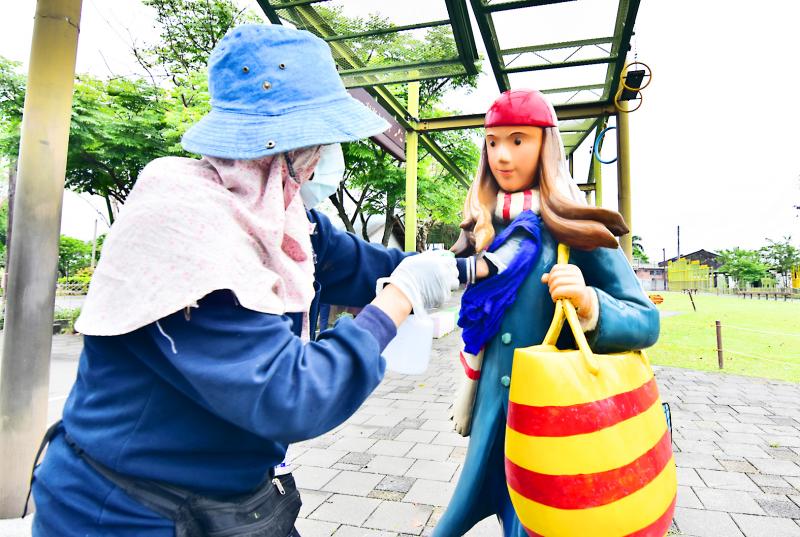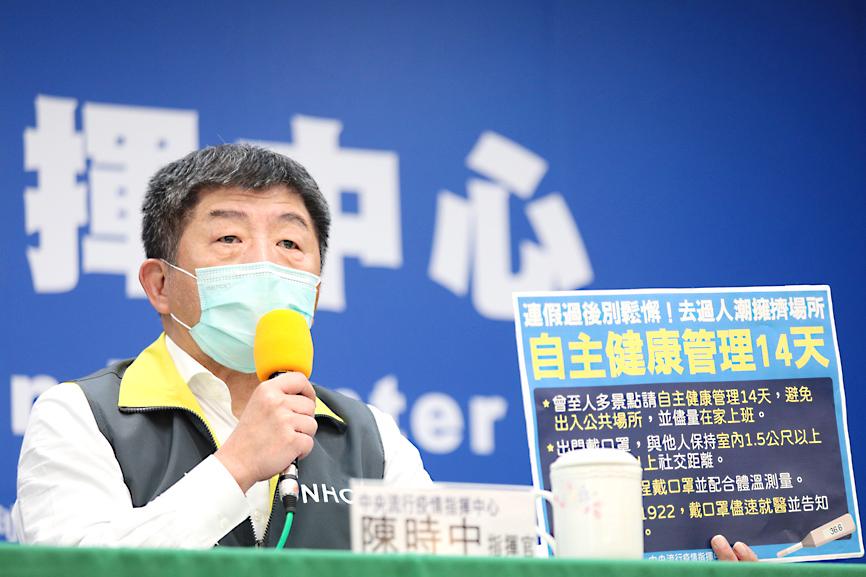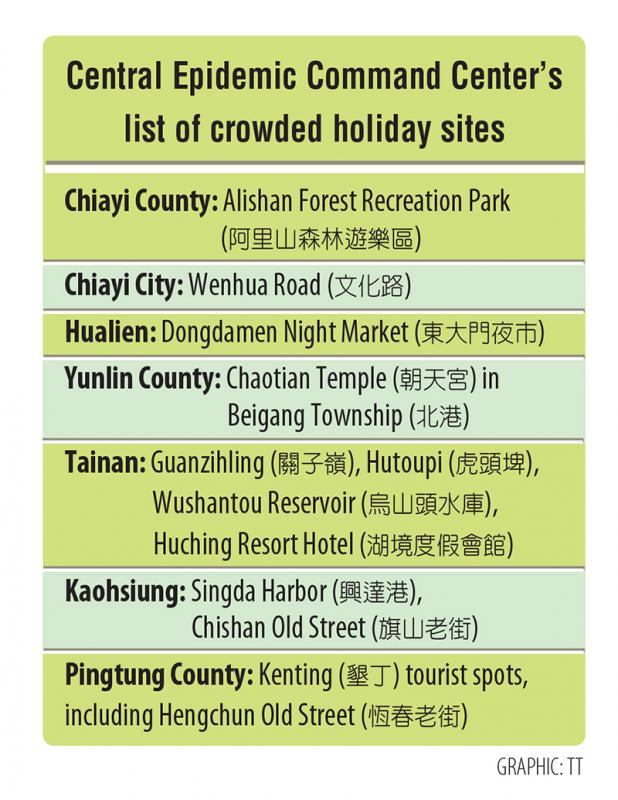People who visited crowded areas or activities over the Tomb Sweeping Day long weekend should start practicing 14 days of self-health management, the Central Epidemic Command Center (CECC) said yesterday.
The large crowds at popular scenic areas and tourist spots over the four-day holiday that ended on Sunday triggered concerns about the risk of COVID-19 transmissions.
“In order to enhance the nation’s disease prevention capacity, we require people to make advance preparations for flexible working hours and working spaces,” said Minister of Health and Welfare Chen Shih-chung (陳時中), who heads the center.

Photo: Chang Yi-chen, Taipei Times
“People who visited crowded places or activities should wear a mask, avoid unnecessary outings, strictly practice social distancing, avoid going to school or work if they develop any symptoms and seek medical attention or the call the 1922 hotline,” the minister said.
They should tell their doctor if they develop symptoms such as a fever, coughing, other respiratory problems, diarrhea, or a loss of the senses of smell or taste, he said.
It would be best if people under self-health management work at home, while students should tell their teachers about their travel history, and healthcare professionals should expand their testing criteria to include people who recently visited crowded sites who have symptoms that cannot be excluded from the possibility of COVID-19 infection, Chen added.

Photo: CNA
However, by “crowded places or activities” the center was not just referring to the 11 tourist spots that it listed in text messages on Saturday reminding the public to avoid crowded places and keep a proper social distance, Chen said.
If people visited other crowded places for a prolonged length of time over the long weekend, they should also practice self-health management, and if they cannot work at home, they should strictly practice the aforementioned measures, as well as social distancing, wearing a mask and frequently washing their hands, he added.
The government cannot provide a comprehensive definition of “crowded places” and it is up to every person to protect themselves, their coworkers and their family when making such decisions, he said.

Employers cannot punish employees who ask for sick leave if their recent travel history could have put them at risk and are experiencing symptoms of COVID-19, he added.
While Chen said he was sorry that some store owners at tourists sites felt the center’s warnings had cost them business, the crowds at such sites had been far worse than the center had anticipated, and the cost to society from cluster infections would be greater than such losses.
The warnings had been necessary, he said.
The CECC would not ban all business activities, but it would adjust policies according to the current situation, with “disease prevention the priority,” he said.

The CIA has a message for Chinese government officials worried about their place in Chinese President Xi Jinping’s (習近平) government: Come work with us. The agency released two Mandarin-language videos on social media on Thursday inviting disgruntled officials to contact the CIA. The recruitment videos posted on YouTube and X racked up more than 5 million views combined in their first day. The outreach comes as CIA Director John Ratcliffe has vowed to boost the agency’s use of intelligence from human sources and its focus on China, which has recently targeted US officials with its own espionage operations. The videos are “aimed at

STEADFAST FRIEND: The bills encourage increased Taiwan-US engagement and address China’s distortion of UN Resolution 2758 to isolate Taiwan internationally The Presidential Office yesterday thanked the US House of Representatives for unanimously passing two Taiwan-related bills highlighting its solid support for Taiwan’s democracy and global participation, and for deepening bilateral relations. One of the bills, the Taiwan Assurance Implementation Act, requires the US Department of State to periodically review its guidelines for engagement with Taiwan, and report to the US Congress on the guidelines and plans to lift self-imposed limitations on US-Taiwan engagement. The other bill is the Taiwan International Solidarity Act, which clarifies that UN Resolution 2758 does not address the issue of the representation of Taiwan or its people in

US Indo-Pacific Commander Admiral Samuel Paparo on Friday expressed concern over the rate at which China is diversifying its military exercises, the Financial Times (FT) reported on Saturday. “The rates of change on the depth and breadth of their exercises is the one non-linear effect that I’ve seen in the last year that wakes me up at night or keeps me up at night,” Paparo was quoted by FT as saying while attending the annual Sedona Forum at the McCain Institute in Arizona. Paparo also expressed concern over the speed with which China was expanding its military. While the US

SHIFT: Taiwan’s better-than-expected first-quarter GDP and signs of weakness in the US have driven global capital back to emerging markets, the central bank head said The central bank yesterday blamed market speculation for the steep rise in the local currency, and urged exporters and financial institutions to stay calm and stop panic sell-offs to avoid hurting their own profitability. The nation’s top monetary policymaker said that it would step in, if necessary, to maintain order and stability in the foreign exchange market. The remarks came as the NT dollar yesterday closed up NT$0.919 to NT$30.145 against the US dollar in Taipei trading, after rising as high as NT$29.59 in intraday trading. The local currency has surged 5.85 percent against the greenback over the past two sessions, central